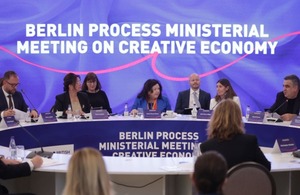Culture ministers from Albania, Bosnia and Herzegovina, Kosovo, Montenegro, North Macedonia and Serbia met in Kotor, Montenegro to explore how creative industries can generate skilled jobs, retain talented young people and deepen cross-border cooperation. Creative businesses already outpace many traditional sectors and are natural partners for the green and digital transitions the Western Balkans must undertake on their path to EU membership.
At the close of the meeting, the six ministers issued a joint declaration committing to embed creativity in national growth agendas. The declaration commits governments to treating the creative economy as a strategic sector, aligning the work of the culture, education and economy ministries, creating stable public financing lines, and providing incentives to encourage private investment. It also opens access to EU and international funds, such as the Western Balkans Growth Plan and Horizon Europe. The ministers expressed their intention to transform the region's cultural richness into a sustainable driver of prosperity and regional cohesion.
The forum was organised under the Berlin Process, an intergovernmental cooperation initiative related to the future expansion of the European Union. It was co-hosted by Dr Tamara Vujović, Montenegro’s Minister of Culture and Media; Kate Ewart Biggs, Deputy CEO of the British Council; and Dame Karen Pierce, the UK Special Envoy to the Western Balkans.
The creative economy of the Western Balkans has taken centre stage in Berlin Process discussions for the very first time.
In the joint declaration, the six culture ministers of the Western Balkans recognised the growing contribution of the creative economy to inclusive growth, social cohesion and regional cooperation, and expressed their determination to unlock its full potential through coordinated action and long-term investment.
They also reaffirmed their commitment to strengthening regional ties, supporting the cultural and creative sectors as drivers of innovation and sustainable development.
More specifically, they committed to:
- Recognising the creative economy as a strategic growth sector and strengthening collaboration between the Ministries of Culture, Education and the Economy in order to embed it in domestic economic plans, skills and innovation strategies.
- Develop shared definitions and data frameworks for the creative economy across the Western Balkans as a foundation for demonstrating its real impact, accelerating regional cooperation and establishing a stronger regional voice.
- Champion the independent creative sector by exploring and adapting models to the Western Balkans context, including proven stimulus tools, to meet the region's specific needs and ambitions in this sector, such as tailored accelerator and SME development programmes, as well as fiscal measures.
- Respect the human and cultural rights as a pre-requisite for regional cooperation.
As the UK Special Envoy to the Western Balkans, Dame Karen Pierce stated: “The adoption of the joint declaration by the Ministries of Culture from the Western Balkans is an important step forward in shaping the future of the creative economy in the region. It’s a clear statement of our shared vision for fostering innovation, promoting sustainable development, and supporting our creative industries as vital contributors to the region’s growth”.
You can read the declaration here.
--
Photo credit: British Embassy Podgorica








